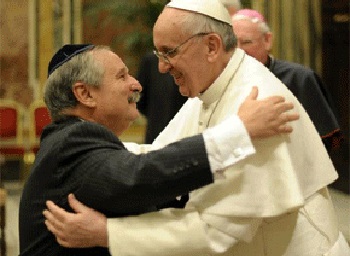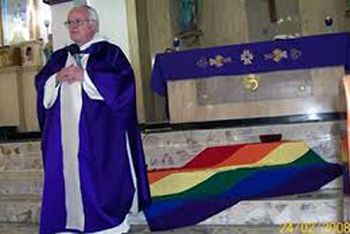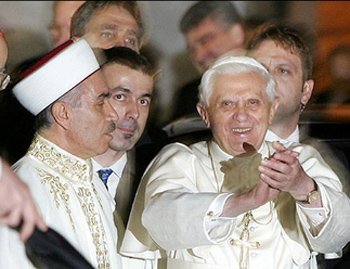Faith under Attack
 |
 |
 |
 |
 |
 |
 |
Progressivist Strategy - Part II
Dominant Ideas of the
‘Only Allowed Thinking’
1. “Each one has his own truth”
This is false since it presupposes that human reason cannot know with certainty the objective truth of things. The first principles are certainly true and cognoscible in an immediate way. For example, what is, is; what is not, is not.
This is also false regarding truths that can be known with certainty through logical reasoning or from the data of the senses.
This is false as well regarding opinions duly based on reason, experience, history and the authority of scholars. Although these opinions have a lesser degree of certainty, they cannot be rejected without serious study.
2. “No one is the owner of the truth”
There is a blaring error in this statement. The truth is not an object that can be owned as material things are. Those who impose it as an imperative of the “Only Allowed Thinking” use this phrase in an ambiguous sense to deny the possibility of having certainties.
In a certain way, certainties are acquisitions of the intelligence, which become the moral and intellectual riches of a person, but differently from material property that can be owned and disposed of as the person pleases. Rather, these certainties own the person who acquires them since, from the moment he accepts them, he can no longer change what he knows.
3. “It is false that outside the Church there is no salvation. All religions, when they are sincerely believed, bring man nearer to God. The Catholic cannot pretend that his religion is the only true one.”
Contrary to this proposition of the “One Allowed Thinking,” Catholic doctrine teaches that outside of the Church there is no salvation. It has been a constant Church teaching that outside the Church there is neither possible salvation nor remission of sins (Denzinger 1613, 1646, 1677, etc), leaving way, however, for the mysterious ways of divine mercy.
 God’s mercy allows that one can be part of the Church by means of three forms of Baptism: baptism of water, which is what all Catholics receive; baptism of blood, received by the martyrs who die defending the Faith and thus enter the Church, and baptism of desire, which pertains to a person who either does not known the institution of the Catholic Church but longs to be a part of it, or when a person - caused by factors independent of his will - is sunk in an invincible ignorance regarding the true Church, but believes in God and the immortality of the soul and practices the Ten Commandments in his life.
God’s mercy allows that one can be part of the Church by means of three forms of Baptism: baptism of water, which is what all Catholics receive; baptism of blood, received by the martyrs who die defending the Faith and thus enter the Church, and baptism of desire, which pertains to a person who either does not known the institution of the Catholic Church but longs to be a part of it, or when a person - caused by factors independent of his will - is sunk in an invincible ignorance regarding the true Church, but believes in God and the immortality of the soul and practices the Ten Commandments in his life.
Those who call themselves Catholics cannot even doubt this teaching, because if they were to doubt and pertinaciously hold the opposite doctrine, they would become heretics and lose their souls. For Our Lord taught that “no one shall be saved except that he perseveres in the Faith until the end.” (Mt 10:22, 23, 13; Denzinger 1793)
4. “All monotheist religions adore the same God. Therefore, the differences among them are not insoluble.”
The one true God is Three in Person and One in His Divine Nature. Those who profess this dogma also believe the Second Person of the Holy Trinity – Our Lord Jesus Christ, true God and true Man – became incarnate in the womb of the Most Pure Virgin Mary. Neither Jews nor Muslims believe in the true God because they believe neither in the Trinity nor in Jesus Christ Our Lord; therefore, we do not adore the same God.
The classification of these religions as “monotheist” only addresses the purely numerical aspect, not the content of their doctrines. The fact that they are not “polytheist” does not suffice to support the mentioned thesis of the ‘Only Allowed Thinking.’
5. “Every idealist who maintains his ideal as true is a fundamentalist,
and every fundamentalist is dangerous.”
One who is moved by an ideal based upon the Faith and upright reason can never be a fanatic, different from the Muslims who commit suicide to foster their “holy war.” A Catholic idealist or a man of honor who dedicates himself to an ideal following upright reason will never commit crimes or immoralities alleging service to an ideal. Should he do so, he would immediately cease to be an idealist to become a fanatic.
The quoted phrase is, therefore, false and ill willed, given that the promoters of the “Only Allowed Thinking” support it in order to discourage a holy, upright idealism and encourage a utilitarian, egotist, hypocritical and agnostic pragmatism, from which originate all the crimes of the modern world, where the ones who are strong and evil dominate those who are week and defenseless.
6. “Human reason cannot prove with certainty that God exists
or the existence of objective morals, applicable to all mankind.”
This is false and was condemned many times by the Church. (See Denzinger 1650, 1785, 1806 etc)
7. “Everything changes with time. What was true yesterday became false today. To maintain old ideas is to be obsolete, and to be obsolete is bad because the good is always in the present or future.”
St. Thomas Aquinas said that “philosophical work can always be improved.” The same can be said of experimental science. However, the same cannot be said about religious and metaphysical truths, which do not rely upon time. God will be always God, being will always be being, and man – upon whose nature morals is based – will always be man. One can have a better understanding in any of these three fields, but it will never contradict what is already known.
 Further, the old ideas in these fields are necessarily the foundation for any advance in knowledge about them. These sound bases cannot ever be discarded as “obsolete.” Even in the experimental sciences, the old ideas are always useful, since they were stepping stones along the way of advances in experimental knowledge. To scorn what is old is a symptom of a stupid superficiality.
Further, the old ideas in these fields are necessarily the foundation for any advance in knowledge about them. These sound bases cannot ever be discarded as “obsolete.” Even in the experimental sciences, the old ideas are always useful, since they were stepping stones along the way of advances in experimental knowledge. To scorn what is old is a symptom of a stupid superficiality.
Affirming this proposition, the “Only Allowed Thinking” tries to empty minds in order to fill them with its false ideas in religious, metaphysical and moral matters. We are seeing the bad nature of these “novelties.” Among them is a new “morals” that includes abortion, homosexuality, free love, egalitarianism, liberalism, communism, laicism etc.
8. “Everything is subjective.
Everything is according to the lens we use to see them.”
This is false. It is a relativist statement that implies the denial of God, the soul, moral laws, etc.
Continued

This is false since it presupposes that human reason cannot know with certainty the objective truth of things. The first principles are certainly true and cognoscible in an immediate way. For example, what is, is; what is not, is not.
This is also false regarding truths that can be known with certainty through logical reasoning or from the data of the senses.
This is false as well regarding opinions duly based on reason, experience, history and the authority of scholars. Although these opinions have a lesser degree of certainty, they cannot be rejected without serious study.
2. “No one is the owner of the truth”
There is a blaring error in this statement. The truth is not an object that can be owned as material things are. Those who impose it as an imperative of the “Only Allowed Thinking” use this phrase in an ambiguous sense to deny the possibility of having certainties.
In a certain way, certainties are acquisitions of the intelligence, which become the moral and intellectual riches of a person, but differently from material property that can be owned and disposed of as the person pleases. Rather, these certainties own the person who acquires them since, from the moment he accepts them, he can no longer change what he knows.
3. “It is false that outside the Church there is no salvation. All religions, when they are sincerely believed, bring man nearer to God. The Catholic cannot pretend that his religion is the only true one.”
Contrary to this proposition of the “One Allowed Thinking,” Catholic doctrine teaches that outside of the Church there is no salvation. It has been a constant Church teaching that outside the Church there is neither possible salvation nor remission of sins (Denzinger 1613, 1646, 1677, etc), leaving way, however, for the mysterious ways of divine mercy.

Francis with Jews; Benedict with Muslims: Monotheist religions adore the same God and lead to Heaven

Those who call themselves Catholics cannot even doubt this teaching, because if they were to doubt and pertinaciously hold the opposite doctrine, they would become heretics and lose their souls. For Our Lord taught that “no one shall be saved except that he perseveres in the Faith until the end.” (Mt 10:22, 23, 13; Denzinger 1793)
4. “All monotheist religions adore the same God. Therefore, the differences among them are not insoluble.”
The one true God is Three in Person and One in His Divine Nature. Those who profess this dogma also believe the Second Person of the Holy Trinity – Our Lord Jesus Christ, true God and true Man – became incarnate in the womb of the Most Pure Virgin Mary. Neither Jews nor Muslims believe in the true God because they believe neither in the Trinity nor in Jesus Christ Our Lord; therefore, we do not adore the same God.
The classification of these religions as “monotheist” only addresses the purely numerical aspect, not the content of their doctrines. The fact that they are not “polytheist” does not suffice to support the mentioned thesis of the ‘Only Allowed Thinking.’
5. “Every idealist who maintains his ideal as true is a fundamentalist,
and every fundamentalist is dangerous.”
One who is moved by an ideal based upon the Faith and upright reason can never be a fanatic, different from the Muslims who commit suicide to foster their “holy war.” A Catholic idealist or a man of honor who dedicates himself to an ideal following upright reason will never commit crimes or immoralities alleging service to an ideal. Should he do so, he would immediately cease to be an idealist to become a fanatic.
The quoted phrase is, therefore, false and ill willed, given that the promoters of the “Only Allowed Thinking” support it in order to discourage a holy, upright idealism and encourage a utilitarian, egotist, hypocritical and agnostic pragmatism, from which originate all the crimes of the modern world, where the ones who are strong and evil dominate those who are week and defenseless.
6. “Human reason cannot prove with certainty that God exists
or the existence of objective morals, applicable to all mankind.”
This is false and was condemned many times by the Church. (See Denzinger 1650, 1785, 1806 etc)
7. “Everything changes with time. What was true yesterday became false today. To maintain old ideas is to be obsolete, and to be obsolete is bad because the good is always in the present or future.”
St. Thomas Aquinas said that “philosophical work can always be improved.” The same can be said of experimental science. However, the same cannot be said about religious and metaphysical truths, which do not rely upon time. God will be always God, being will always be being, and man – upon whose nature morals is based – will always be man. One can have a better understanding in any of these three fields, but it will never contradict what is already known.

New morals: Mexican Bishop Vera Lopez welcomes the homo community with a rainbow banner in the presbitery
Affirming this proposition, the “Only Allowed Thinking” tries to empty minds in order to fill them with its false ideas in religious, metaphysical and moral matters. We are seeing the bad nature of these “novelties.” Among them is a new “morals” that includes abortion, homosexuality, free love, egalitarianism, liberalism, communism, laicism etc.
8. “Everything is subjective.
Everything is according to the lens we use to see them.”
This is false. It is a relativist statement that implies the denial of God, the soul, moral laws, etc.
Continued

Posted February 24, 2014
______________________
______________________











